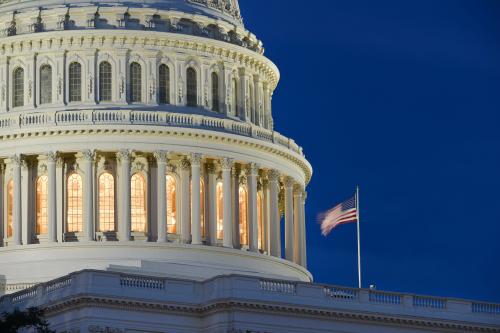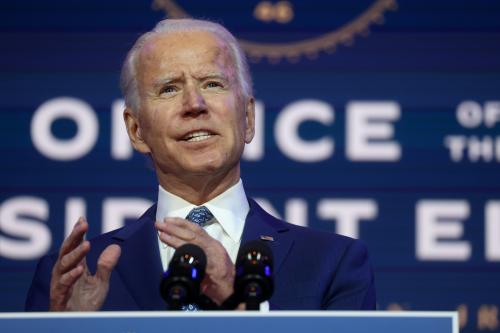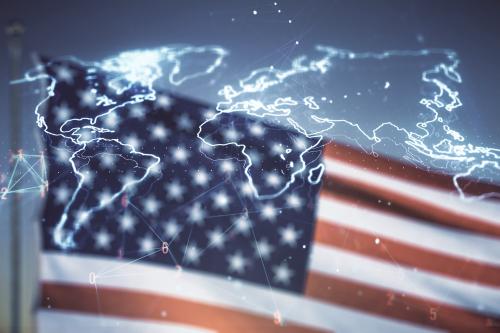The nomination of Samantha Power to be the administrator of the U.S. Agency for International Development (USAID) has excited a demoralized agency and the entire development community. While the mission of USAID has been recognized along with defense and diplomacy as contributing to national security, this is the first time its administrator has been formally given a seat at the National Security Council (NSC) principals’ table.
Power, the ambassador to the United Nations during the Obama administration, will now lead an institution frequently mischaracterized as a purely technocratic instrument of foreign policy rather than as a policymaking actor. Yet, we can attest that USAID has always played a policy role not only in devising the U.S. government’s development strategy, but in contributing to deliberations on other critical national security concerns. Power’s appointment to the NSC means that she will not have to be invited on a case-by-case basis.
To be sure, some development activists worry that too broad an engagement will distract from USAID’s explicit development and humanitarian mandates. Others express concern that the USAID administrator could intrude on the State Department’s traditional turf. These concerns should not be dismissed out of hand.
USAID’s policy voice can be vital, especially in a world where the source of many transnational threats is underdevelopment.
State and USAID have similar but distinct missions. The perspective of each of the two institutions is complementary and many professional attributes are the same: Intercultural and language skills, for example, are essential. There are differences, however: Development professionals are primarily responsible for managing resources and programs, and their relationships in the field are with multilateral and bilateral aid organizations, sectoral ministries, and nongovernmental organizations.
USAID’s policy voice can be vital, especially in a world where the source of many transnational threats is underdevelopment. Ideally, the State Department and USAID interact with each other as civilian partners within the NSC, even as the USAID administrator operates under the foreign policy guidance of the secretary of state. The presumption is that U.S. foreign policy is informed by the development perspective as well as by statecraft considerations. In practice this rarely creates dissonance.
President Biden’s national security team is as collegial as any assembled in the modern era. On a personal level, there is great respect and trust, emanating from having worked together on national security matters during the Obama administration. Power, having previously addressed policy from more than one institutional perspective, will no doubt be fully capable of formulating the USAID position on an issue in a constructive and supportive manner. But what is unique about that perspective?
First and foremost, there is a long history of evolving development thought. Effectiveness principles have been agreed among donors and their partners. Aid tied primarily to the financial interest of a donor should be avoided. Donors should strive to enhance local ownership and to use local systems whenever possible. Projects should be evaluated to determine that they are not creating dependency. These and other principles are designed to enhance prospects for sustainable development, or self-reliance.
Occasionally, the desire for short-term diplomatic or domestic gain conflicts with these principles. Policymakers should understand the trade-offs involved, including the costs to long-term development investments. In the end, the development perspective may well be rejected, but not always. The past offers several relevant examples.
At the beginning of the Clinton administration, the desire to boost American exports led the Commerce and Treasury departments to advocate for a fund that would compete with nations that were tying their aid to national exports. However, an agreement had been reached during the last year of the first Bush administration to curb “tied aid,” and the agreement was having a positive effect. The biggest offenders, France and Japan, were beginning to modify their behavior. Creating a “tied aid” fund in the U.S. would not only undermine the agreement, it would create a competition that the US was likely to lose.
Development and humanitarian relief complement diplomacy and defense in times of crisis and in preventing the negative consequences of underdevelopment.
USAID opposed the creation of the fund and its position prevailed. Today, tied aid, while still a problem, is less detrimental to development efforts.
As administrator, Power should be on the lookout for similar policies that will directly undercut sustainable development. But the USAID perspective will be brought to bear on the major transnational issues of the day as well.
Global health issues are front and center with the pandemic. USAID’s Predict program—a global health surveillance system designed to track the transmission of pathogens from animals to humans—is scheduled to be restored. The agency will also play a key role in distributing the COVID-19 vaccine to developing countries.
USAID has been playing an instrumental role in helping developing countries become more resilient to the effects of climate change, though it hasn’t been allowed to use the words during the Trump years. Now the Agency will openly provide the technical assistance needed to help partners reduce carbon emissions and preserve carbon-absorbing rainforests.
The Biden administration is committed to bringing resources to Central America in a major initiative to create jobs, reinforce the rule of law, oppose criminal gangs, and encourage better governance. USAID will lead that effort.
Power’s voice will be heard on each of these issues and will play a role in encouraging other donors to join in a global effort. This form of collaboration is called “development diplomacy” and it works best when those responsible for the expertise and the resources are combining forces. There are many past examples where U.S. leadership has produced collective action and/or resolutions to enhance development effectiveness.
The Millennium Development Goals, for example, were a product of this form of diplomacy. In 1996, the High Level Ministerial of the OECD Development Assistance Committee (the DAC) produced a report designating eight strategic goals for the global development community (“Shaping the 21st Century: The Contribution of Development Cooperation”). After two years of negotiation, the report was approved by the USAID administrator along with ministers of development from other donor nations. After being endorsed by G-7 Summit leaders in 1998, the United Nations in 2001 adopted the report as the Millennium Development Goals. Similarly, the content of the 2015 Sustainable Development Goals reflected the heavy influence of the global development community.
One might be surprised to learn that arms sales fall under the purview of USAID, albeit tangentially and rarely with effect. The Foreign Assistance Act gives the administrator a role in commenting on arms sales to developing countries.
In 1995, the State, Defense, and Commerce departments joined together at the NSC to advocate for the sale of F-15s to Chile. The USAID adminstrator opposed the sale on the grounds that the purchase of sophisticated aircraft by Chile would trigger an arms race by countries that could ill afford the costs. The sale was put on hold for six months until the aircraft was reconfigured as a defensive system. President Biden’s announcement last week to halt offensive arms sales to Saudi Arabia over the Yemen situation is a contemporary example of incorporating humanitarian considerations into a national security decision.
Complex humanitarian disasters will bring the USAID administrator into the role of interagency coordinator. USAID’s Disaster Assistance Relief Teams (DART) are often first on the scene of an international disaster. They are now part of USAID’s renamed Bureau of Humanitarian Assistance, which regularly works with the U.N. to coordinate the international response to complex disasters. Even when the U.S. military engages in relief efforts, they operate under USAID’s guidance.
In the field, USAID missions have contacts with a range of local counterparts involved in governance, health, environmental, education, and private sector programs. These missions provide unique perspectives on the political and economic contexts of the countries where they work. Their insights inform the ambassador’s country team. And when disputes regarding these strategies are reviewed by Washington policymakers, the USAID administrator’s access to vital field information can serve to enlighten NSC deliberations.
Relations with China undoubtedly will loom large in development of the Biden administration’s national security strategy. While much of the focus has been on trade and security, China’s global reach relies heavily on the expansive role it is playing in developing countries through its Belt and Road Initiative and the Beijing-dominated Asia Infrastructure Investment Bank.
USAID program activities, including those promoting transparency and good governance, serve as a counterweight to Chinese assistance efforts, which often leave countries with significant debt overhang and poor infrastructure. This is an area for both competition and cooperation.
Cooperation between traditional Western donors and South-South donors is increasing. The combined efforts of traditional and South-South donors, including China, can meet a global need, particularly with respect to infrastructure, health, and the environment. However, the contrasting governance systems—democratic institutions versus the authoritarian model—present the arena for competition. Moreover, China’s odious human rights record will temper a fully collaborative relationship between the two leading powers.
While the State Department always leads efforts to negotiate to end violent conflict, USAID seeks to prevent conflict by working with local partners and other donors to address the tensions within a society that could lead to a societal breakdown. When conflict occurs, USAID provides relief to affected civilians. In post-conflict situations, USAID offers transitional aid to foster reconciliation. Relief-development coherence is an essential part of USAID’s operating doctrine, and is reinforced by the division of responsibilities articulated in the just published U.S. Global Fragility Strategy.
USAID’s voice in national security discussions will assure that these elements are incorporated into U.S. and global strategies to prevent conflict and reestablish peace. Development and humanitarian relief complement diplomacy and defense in times of crisis and in preventing the negative consequences of underdevelopment.
Samantha Power has been at the policy table in times of crisis. She is a respected geostrategic thinker who possesses a keen understanding of the international community. Her position on the National Security Council will enable her agency to have an institutionalized frontline policy voice.
The Brookings Institution is committed to quality, independence, and impact.
We are supported by a diverse array of funders. In line with our values and policies, each Brookings publication represents the sole views of its author(s).







Commentary
USAID’s policy voice should be heard
February 10, 2021